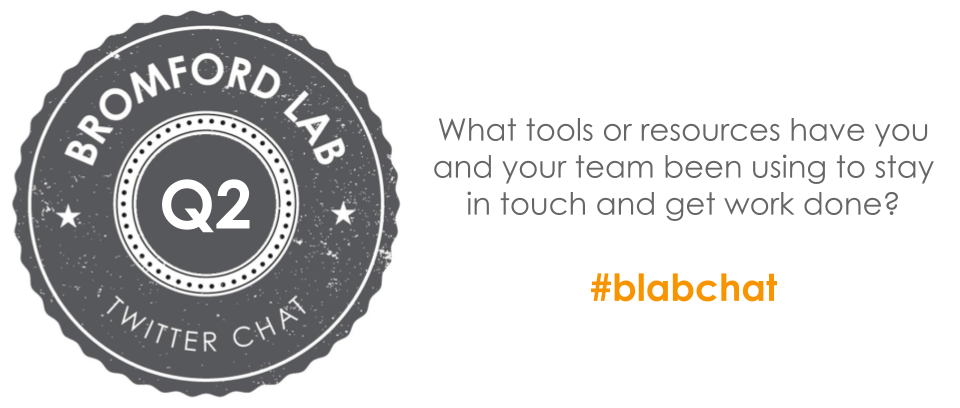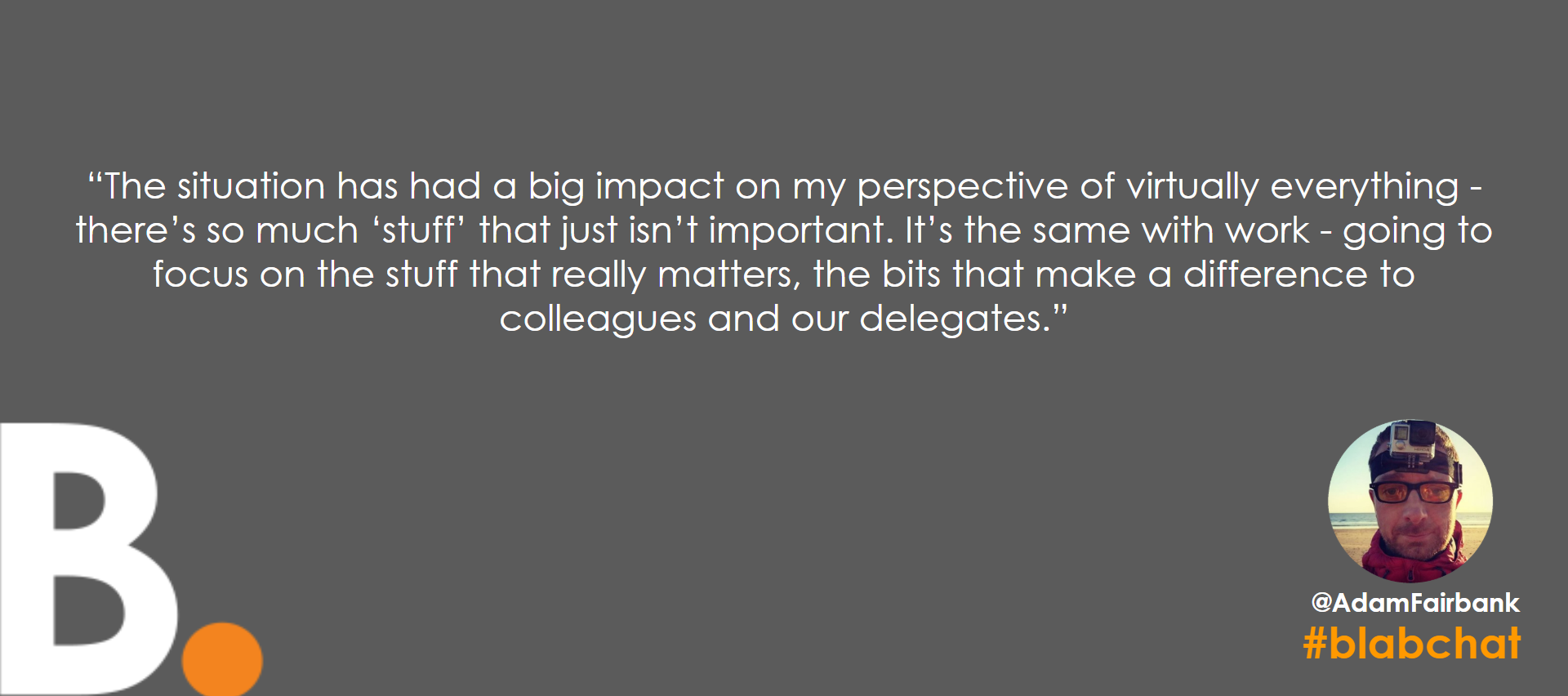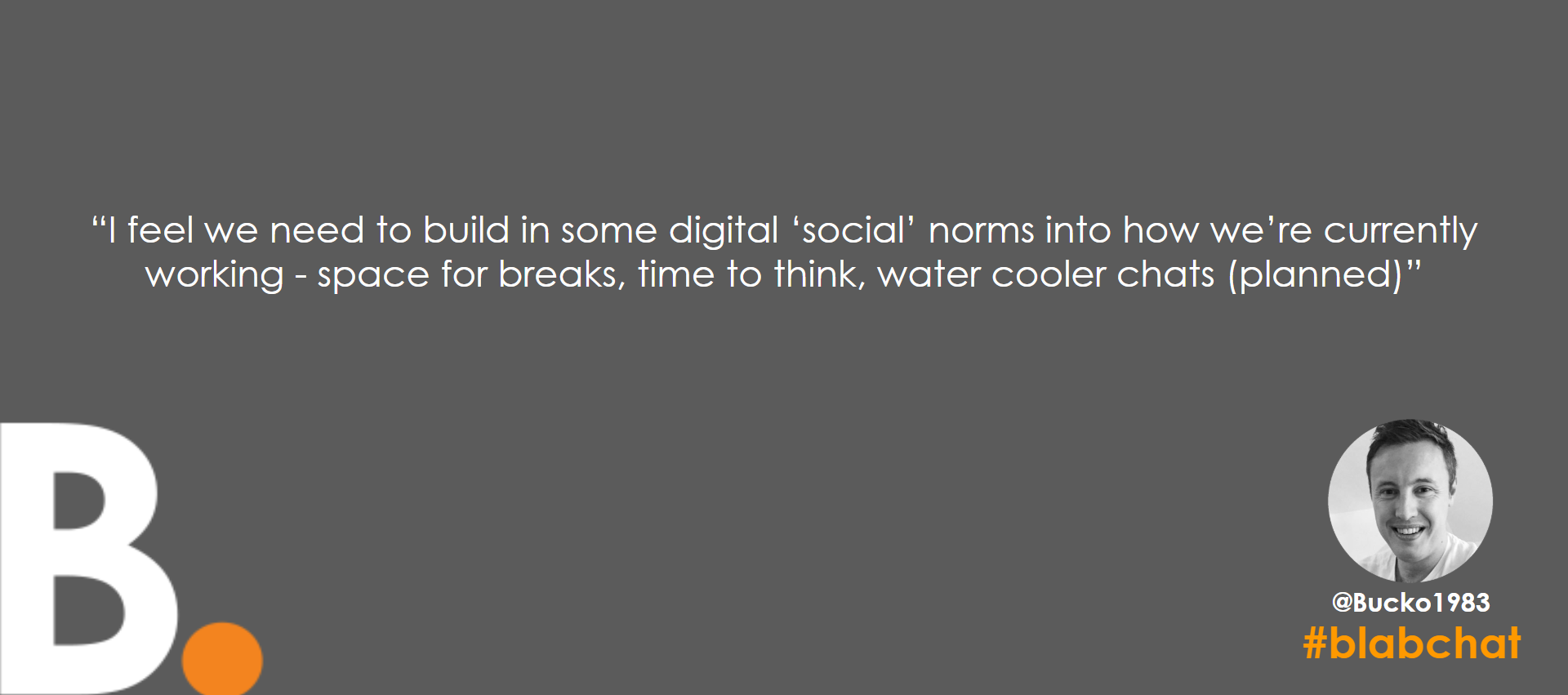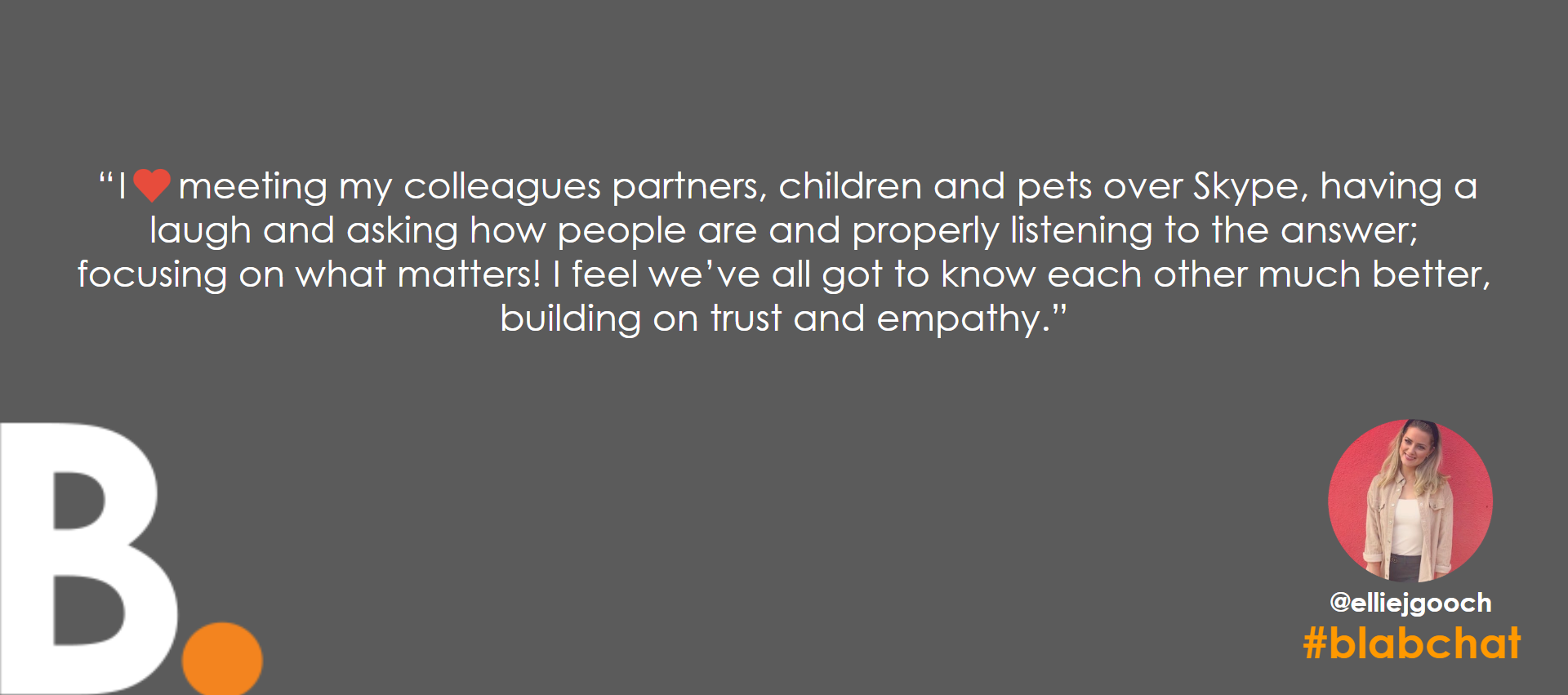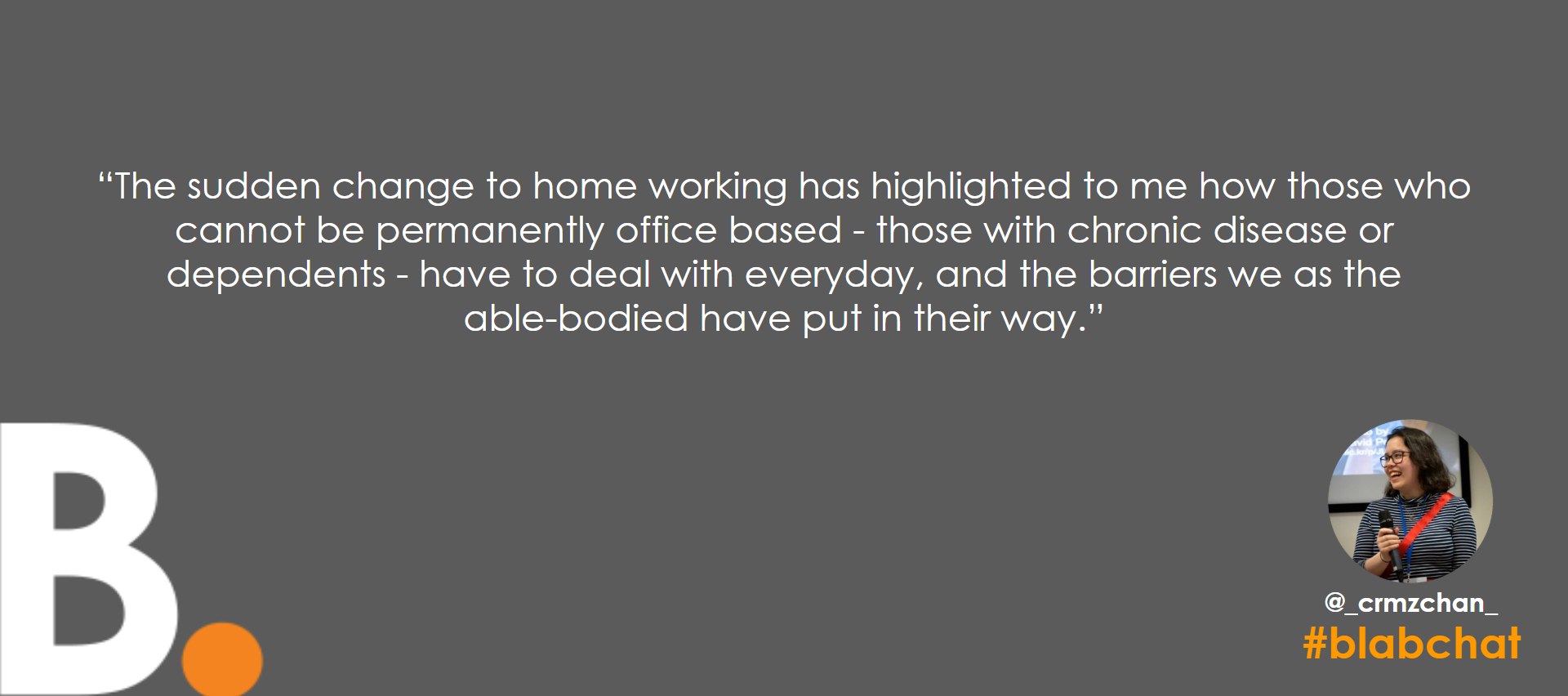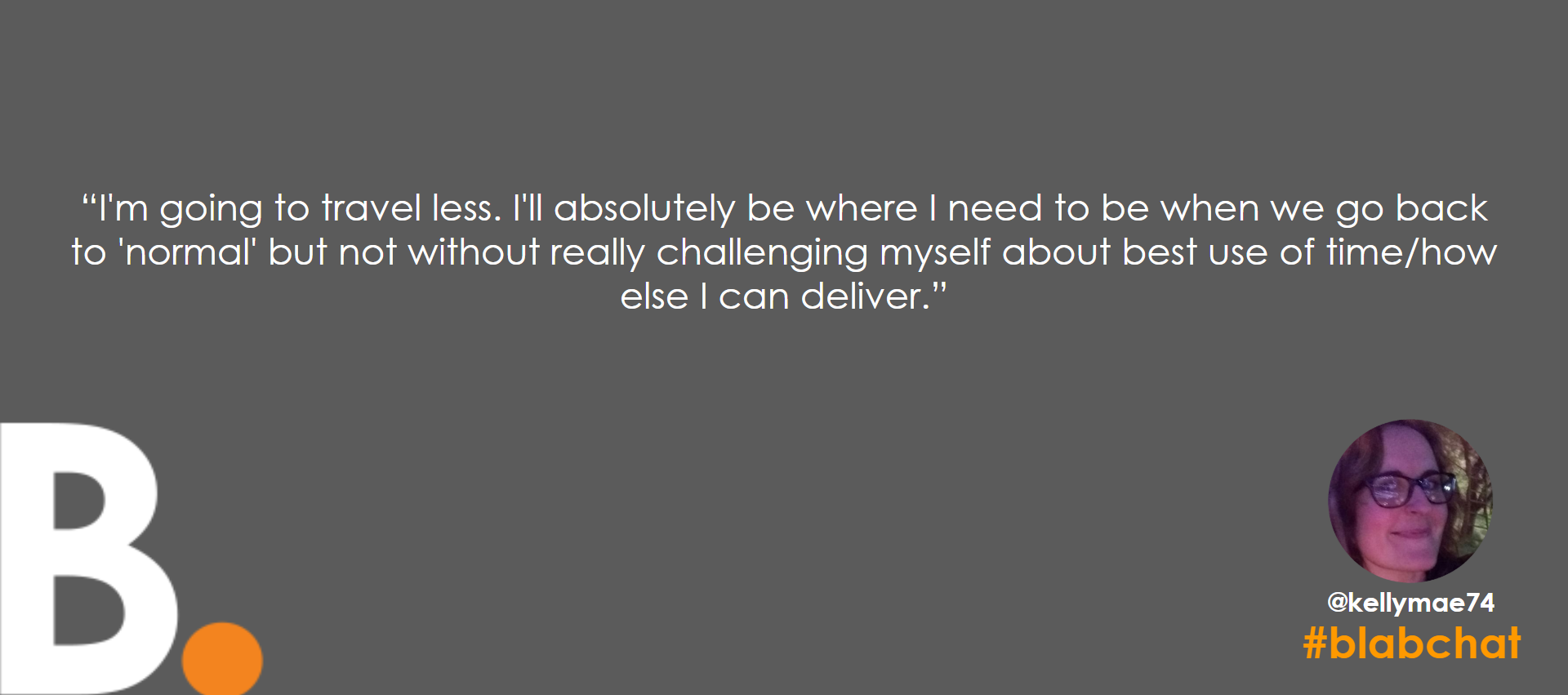This week #blabchat returned for a special double edition, and what a double edition it was. Once again, we were joined by a diverse, multi-sector and multi-national participant group with contributions coming in from as far away as the USA. As our theme linked to a global pandemic, we wanted to give people across different time zones the opportunity to join the conversation, so for the first time ever, we ran a lunchtime chat and an evening chat to discuss the impact of COVID-19 on the way we work; the places we are working, the tools we are using and fundamentally how we are all overcoming the challenges of collaborating in socially distant workplaces.
So, a couple of things right up front, firstly, you might have noticed that the title of this post is collaborating in ‘physically different’ workplaces, rather than following the theme of the #blabchat - collaborating in ‘socially distant’ workplaces. Whilst socially distant might be the official term adopted by the Government, it has been overwhelmingly clear from the contributions that in many cases, people are more social than ever, despite the lack of physical proximity to colleagues, customers, friends and neighbours. These are sentiments that have been shared by other commentators over the past few weeks as well as those contributing to this conversation, so it made sense to reference that here too.
Secondly, this is certainly one #blabchat for which I would strongly recommend that readers of this post check out the hashtag, filter by latest and track through the conversation (which is still being added to as I type). The action was so frenetic on Wednesday, I fear I can’t possibly do those who contributed justice here.
So, here it is, my best attempt at a round-up of both the lunchtime and evening sessions:
I’m tempted to say writing this post, but my personal view is actually one echoed by almost all who contributed to the conversation; any combination of juggling work with childcare, staying motivated, finding a new routine and dealing with a changing workload. For those of us lucky enough to be able to work from home, the working world has been turned on its head. But as Neil Tamplin expressed, feeling those challenges is a privilege, not everyone is so lucky, so we shouldn’t feel too sorry for ourselves. In any case, as contributors went on to share, it’s not all bad.
A sense of loss of control was echoed by several contributors, including our own Katie Fletcher who shared that ‘It’s hard not being in control of your day when you have a child to take care of’, however, ‘we need to keep reminding ourselves that it’s ok to break your day up into work time and playtime and not feel guilty for being present in both.’
It feels like the current situation we find ourselves in might actually provide us with an opportunity to finally crack putting the 'flexible' into 'flexible working'. In the past, I’ve often felt that the term has been confused with 'mobile working' - whilst we might have been working at home, on the train or in a coffee shop, it was more likely than not during 'office hours' - the classic 9 to 5. What is being born out time and time again at the moment, for many of those working in traditional office-based roles at least, is that doesn't need to be the case. Whilst day time meetings may be unavoidable at times, that report you need to write can be done at 9 pm, so why feel guilty about making the most of the afternoon sun to go out for a run or spend some time with the kids?
Paul Taylor suggested that ‘extended remote work requires new rules. It’s OK to look like crap on a video call. It’s OK to turn the video off when you REALLY look like crap. It’s not unprofessional to have kids and dogs in the background and playing video games in the day is now acceptable’. It’s sometimes tricky to stay motivated when working remotely, especially under the current lockdown (something still so black mirror about typing that word) conditions, so finding new ways to work as a team is essential. The rules of work (for many of us) have changed almost overnight.
John Wade shared a tweet he had picked up earlier in the day from a GP who had just carried out his first GP virtual Nursing Home ward round via video link. In the tweet, the GP commented, ‘this time last week I had never done a video consultation before. When coronavirus is all over we will reflect on how we have achieved 20 years worth of NHS transformation in only 6 months’. It’s true that the speed of change we are experiencing at the moment is tremendous. Such as in wartime (I guess this is a war of sorts) necessity prevails. In more 'normal' times it's all too easy to come up with reasons why something couldn’t possibly work; we are afforded the luxury of contemplation and delay. In times of crisis, we have to act quickly and silence those voices. After this, there will be a 'new normal', but will our approach to change have changed? Will we revert back to seeking to have all of the answers before we start something, or will we keep our willingness to experiment? I think this is something we’ll all need to revisit once the world calms down a little.
Ellie Gooch shared a story which is typical of such creativity. She explained that ‘onboarding new colleagues has been a challenge, particularly without kit’. But it has forced her to ‘be more creative’ and has also led to both parties learning more about each other. ‘My new colleague said today that he feels really welcome and is grateful for efforts made in a tough time’. Andy Johnson shared a tool he’s been using to send welcome videos to new starters, which he said has been received well.
But whilst it feels like people have been enjoying the opportunity to try out something new, Coco Chan was open about it coming at a cost to the planned activity, ‘the challenge has been letting go of what we were building to work on emerging priorities. There are lots of exciting things in the pipeline that we’ve had to park for an indefinite period of time.’
As a team, we’ve always tried to incorporate remote working and collaborative tools into our day today and having discussed it with the team, it feels like this unconscious preparation has served us well (so far) during the past few weeks. Our own Adam Boyes shared some of our favourite tools in a post he published at the end of last week. But we are also enjoying finding out about new tools which we didn’t previously know about, or tools which we knew about, but hadn’t tried. I think it would be accurate to say that every one of our contributors have been using such tools with vigour over the past few weeks, and the interesting thing for me is, they arrived at those without the help of a slick sales pitch or fancy salesperson to deliver it. Go figure!
You only need to have been glancing at social media over the past two weeks to pick up the challenges that IT and governance teams must be facing not only in the UK but across the globe. The net worth of Zoom founder alone has increased by more than $20million since the coronavirus crisis started. If nothing else, the stories of adoption that people have been posting are a flashing indicator that system-lockdown IT policy simply doesn’t work. When people are faced with adversity, they will find a way, whether that’s creating a spreadsheet to plug a requirements gap in the corporate system or getting a licence for Zoom or Miro when physical workshops are out of the question. Sure there may be questions around governance and risk, but when you are sat in the pressure cooker, it seems that the only risk would be to do nothing. The real challenge for IT and governance teams is to find a way to accept that people will use these tools, and, not only in times of global crisis. The real question is how to coordinate adoption in the open rather than attempt to control it and risk pushing it underground.
Once again Coco Chan provided an honest contribution by asking, ‘is anyone finding they are in new work tool overload?’. For many of us, the number of our communication channels we use has grown rapidly, she went on to add, ‘for me at the moment, I have email, personal IM, hangouts team chat, video calls, corporate news feed, work task board, Twitter’. Whilst there is currently a unique opportunity to test (formally/informally) lots of new things which could be great in the long run, between work channels, friends/family channels and now school channels, it can often be a little noisy sat at the kitchen table or in the home office these days (literally if your notifications aren't on silent).
Our Bromford colleague, Jo Mason shared how her experience of delivering smaller group sessions over skype had been positive and that the team would be hosting a ‘This is Bromford Induction’ for new colleagues over skype next week.
Whilst contributors were keen to share positive stories of how their teams had been working and socialising over video, Joel Bailey provided a grounding thought that over the coming weeks, as we get used to a new normal, we may tire of video meetings just as we do of physical ones, ‘we need to adopt a healthy avoidance of all video conferences that (a) are unnecessary and could have been an email and (b) are important but are badly run and go nowhere. Remote working takes no prisoners’.
We may only be around two weeks into this in the UK, but just like deep sleep time in the film Inception, two weeks in lockdown time feels like two months. Sarah Williams commented, ‘I don’t really think we’ve been at it long enough to figure out what works well, but I think we would benefit now from a more concerted effort to meet up. #MondayQuiz is going to be a regular thing’. It’s fair to say that we clearly have a lot of time ahead to look back in retrospect, but right now, has people’s perspective on working remotely already started to shift?
There was a sense that by shifting to full time remote working, some contributors felt that they were missing out on something, despite also gaining some unexpected positives.
Neil Tamplin shared that ‘being fully remote has meant being much more intentional about making sure people are okay and making time for general chit chat. Not being in an office makes it a bit too easy to optimise for only work-related conversations’.
Sarah Williams also hinted that not being in the office meant you could miss out on vital incidentals, ‘you hear so much more about what’s going on in an open plan. I’m feeling out of the loop now and haven’t found a fix yet, I’m trying not to email overload’.
But on the whole, there seemed to be a general consensus in terms of how those contributing felt remote working was actually working out better than they had previously thought it might and sometimes, better than the ‘old’ ways.
Previously, remote work had often been selective; an opportunity to work from home away from office distractions and get that report done. But, Paul Taylor shared that whilst ‘there’s a tendency for remote work to be less social and more transactional. It needn’t be a lonely life at all’. Paul joined others in suggesting that ‘we have to make more time to talk rubbish rather than just follow meeting agendas. We can still be social even in a physically distant world’. Angela Broadbridge provided an honest contribution by admitting that, ‘this (conversation) is giving me lots to think on, I’m bad for jumping straight in to work and often have to remind myself about small talk! I’ve still got some shifts to make’. This is perhaps true of us all, after all, two weeks in is still the honeymoon period, how will we all be feeling in two months' time?
John Wade’s tweet around people reporting more contact with colleagues, friends and neighbours chimed well with the reason for referencing ‘physical distancing’ rather than ‘social distancing’ in the title of this post. Paul Taylor supported this by sharing that, ‘In the past 10 days I’ve spoken to family, friends and neighbours more than I have in the preceding year. When life returns to ‘normal’, we can't go back to living and working the same as we did before. It would be a collective failure if we were to do so’. Glen Ocsko, also commented, ‘weirdly I'm finding my normally-remote working team more sociable than ever. People are making more of an effort to interact about non-work stuff than they ever did before’. Bryony Taylor supported this by also sharing, ‘we are having virtual tea breaks a couple of times a week where we don’t talk about work and everyone grabs their pets/children to wave at colleagues’. I’m sure there is something about innate human behaviours in there somewhere - perhaps something we could explore in a future #blabchat?
Our Bromford colleague Ellie Gooch summarised the thoughts of many contributors in her tweet describing her enjoyment of getting to know more about colleagues by meeting their partners, children and the pets over the past two weeks. Just a few months ago the world was laughing at the guy being interrupted by his toddler daughter whilst being interviewed live on BBC News, but if that happened today, I’m not sure we would view it quite the same. It really does feel like the world has moved on in a way that means we will never truly go back to how things were. Jo Mason commented that ‘it somehow feels more personal being invited into someone's home as their workspace - really helps with those human moments. Whether that's noticing their plant/lamp/whisky collection. Steve Nestor supported Jo’s comment by adding, ‘it all helps to appreciate the human element’. It’s why as a service designer, I’m always so keen to get out and meet customers in ‘context’; you gain a far richer understanding of people when you meet them in their own homes and have a conversation which moves beyond a functional and transactional connection. It works two ways.
It certainly feels like somewhat ironically, becoming more physically distant may well have brought us all closer together with our friends, colleagues and neighbours. Communities seem to be blooming, yet there is no physical contact.
It seems many of us have either changed our approach to remote working over the past week or two or are now capitalising on the safety of the herd to become more honest about it. Why should the guilt of a less than productive day at home be any greater than that of a less productive day in the office? As Paul Taylor suggested, employers should place a greater value on meaningful outcomes than filling hours with ‘work about work’.
Normal, what’s normal? It’s hard to see things ever going back to the way they were.
Steve Nestor made an excellent point when he commented, ‘who says 'normal' was the right way to do things? We have an ideal opportunity to reset, rethink and rewire ourselves to create a more productive, more connected, happier and healthier new 'normal.' It’s a great observation, isn’t it? It may be uncomfortable to acknowledge it right now, but it’s likely that despite all of the pain, hurt and devastation, what we are living through right now may also leave a positive legacy through the opportunities it affords us.
Even the most reluctant employers will surely see that much of what they thought wasn’t possible in terms of remote working strategies can actually be done, perhaps achieving better results than currently being achieved.
We might also see a global raising of the game. Taking remote working 1.0 rapidly through a generational leap, evolving to a point where barriers are removed and continuity of service prevails. As Coco Chan commented, ‘we talk about accessibility in design. What about in-office or job design? How do we make sure in our ‘new world’ that our old ideas of normal do not exclude people’.
It appears that the term ‘normal’ is becoming a little prickly. Even in such uncertain times, whilst we all look forward to a less restrictive time where we feel safe again, I’m not convinced from the discussion on Wednesday that people want that to mean things go back to exactly how they were before.
Our own Adam Boyes suggested that one thing he would like to do differently moving forward is to, ‘keep in contact more with colleagues who work at different offices and ensure the wellbeing initiatives continue’. Angela Broadbridge’s comment is similar, ‘I’m going to start the day by asking how are we doing, use new rituals to mark the end of the workday and have a proper healthy lunch and a walk every day’.
Many contributors hoped that the situation might also provide an opportunity to focus on what’s important on both a personal level and globally. and carry that forward.
Andy Johnson mirrored several contributors including Sharon Dale by suggesting that he would, ‘like to think this will make us all greener too. In my lifetime I don’t think nature has ever sounded so clear as it has in the last 2 weeks. I hope we all think twice about travelling unnecessarily and instead make use of the tech like we are now’.
Overwhelming, those who joined the conversation were clear about the opportunities that lie ahead. The speed of adoption has been rapid. In the business speak of storming, forming and norming we are still transitioning to the forming stage. There is much to learn over the coming weeks and months. The way we are working right now might be working now, but it probably won’t be perfect. Over the coming weeks and months, these methods and the tools we use will evolve. Perhaps it’s pertinent to once again make a battlefield comparison and look at the ways that an army collates their learning during the first chaotic weeks of deployment. They may just have the answer to the question posed by Ena Lloyd, ‘there is so much learning from the past few weeks to share. Organisational resilience being one. Staff behaviours demonstrating willingness and adaptability is another. How do organisations capitalise on that?’
It feels like there is a role for all organisations to now capture and curate all of this rich experiential insight in order to ensure that when the time comes to relax the restrictions and open up the offices again, we don't all default to the old ways of working. It feels like to do that would be a huge setback and a wasted opportunity.
As always, thank you to everyone who joined the conversations on Wednesday. We saw lots of new faces join the chat this time, so thanks for stopping by - we might provide the hashtag but you provide the conversation. I’ll leave you with one final tweet from Ellie Gooch and her thoughts on what she would like to do as we move forward; some things we might all do well to consider!
Connect more, be kinder, more human and also be creative.
If you enjoyed reading this, please feel free to sign-up to our new newsletter where we will be sharing all the latest Bromford Lab blogs, podcasts and other interesting articles we think you might be interested in!
Until next time, stay safe!
- - -





